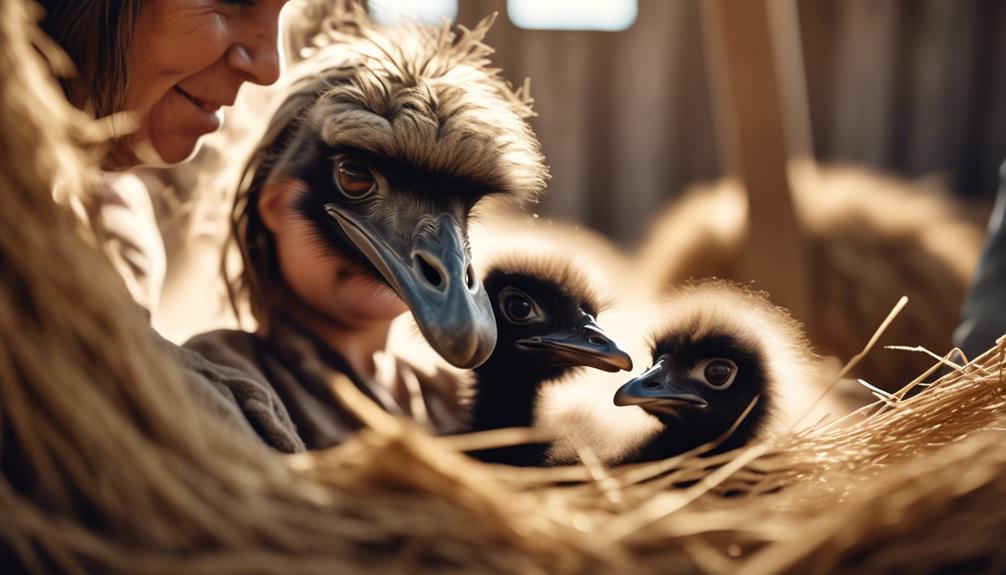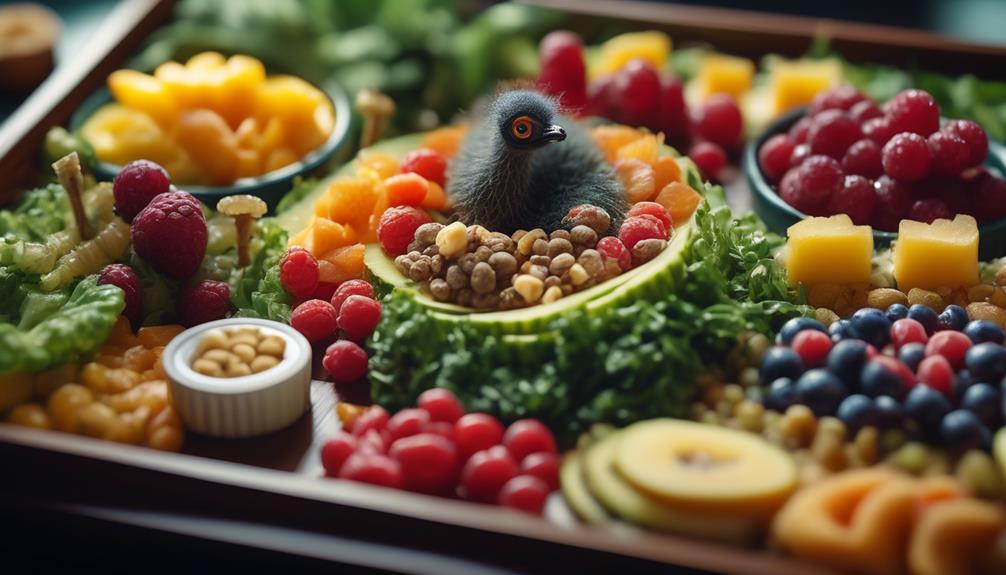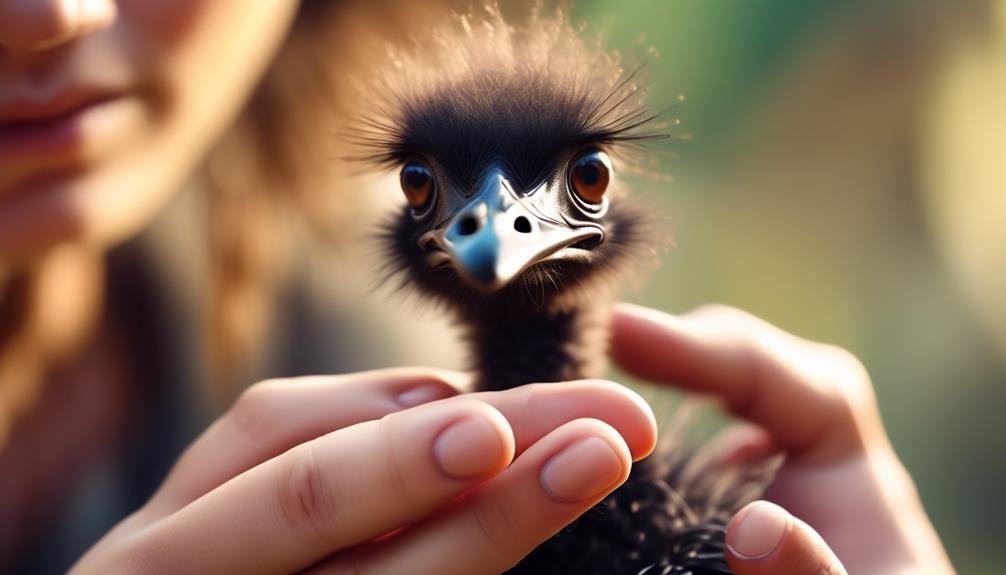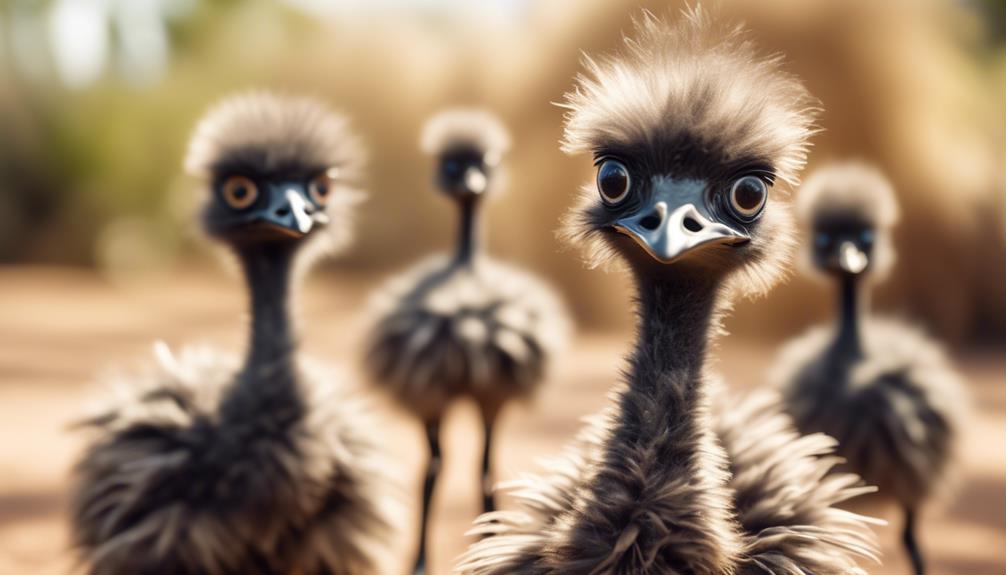
Are you considering raising baby emus?
Perhaps you came across an adorable video online of a baby emu exploring its surroundings and now you're intrigued.
Well, you've come to the right place. Raising baby emus can be a rewarding and unique experience, but it also requires dedication and knowledge.
In this comprehensive guide, we will walk you through everything you need to know about raising baby emus, from understanding their species to troubleshooting common challenges.
So, whether you're a seasoned emu enthusiast or a curious beginner, get ready to embark on a journey of discovery as we uncover the fascinating world of raising baby emus.
Key Takeaways
- Emus require a spacious and secure habitat that mimics their natural environment, including ample space to roam and forage, a tall and secure fence, and a shaded area with environmental enrichment.
- Baby emus need a diet rich in protein, vitamins, and minerals, starting with emu starter feed and gradually introducing fresh greens. It's important to monitor their food intake to prevent obesity or malnutrition.
- Emus are social animals that benefit from socialization and bonding with their owners. Spending quality time, engaging in playtime activities, and introducing them to other emus or friendly birds can strengthen their social skills.
- Regular veterinary check-ups, balanced nutrition, exercise, mental stimulation, and preventive care measures are crucial for the health and wellness of emus. Monitoring their behavior and appearance for signs of illness or distress is important.
Emu Basics: Understanding the Species
To properly care for baby emus, it's crucial to have a thorough understanding of the species. Emus are native to Australia and are the largest birds in the country. They're well-adapted to their natural habitat, which includes open grasslands, savannas, and woodlands. Emus need plenty of space to roam and forage, as they're highly active birds.
When it comes to breeding and reproduction, emus have a unique mating ritual. The male emu takes on the role of incubating the eggs, which is quite rare in the avian world. After mating, the female lays her eggs and leaves them in the male's care. The male guards the eggs and incubates them for about 8 weeks until they hatch. This process requires a lot of dedication and attention from the male emu.
As baby emus grow, it's important to provide them with a suitable habitat that mimics their natural environment. This includes a spacious enclosure with plenty of grass or vegetation for them to graze on. It's also essential to provide them with a balanced diet consisting of specialized emu feed and fresh water.
Understanding the habitat requirements and breeding behavior of emus is essential for successfully caring for baby emus. By providing them with a suitable environment and proper nutrition, you can ensure their health and well-being.
Setting Up the Perfect Emu Habitat
Now that you understand the importance of providing a suitable environment for baby emus, let's explore how to set up the perfect habitat for these active birds. Creating the ideal emu enclosure design and incorporating emu habitat enrichment will ensure that your baby emus thrive and lead happy lives. Here are four essential elements to consider:
- Space to roam: Emus are highly active birds that require ample space to move around. Aim for at least 1,000 square feet per emu to allow for running, stretching their wings, and engaging in natural behaviors.
- Secure fencing: Emus are known for their ability to jump high, so make sure your enclosure is surrounded by a tall fence that's at least six feet high. Additionally, ensure that the fencing is sturdy and secure to prevent any escapes or potential dangers.
- Shelter and shade: Emus need access to shelter to protect them from extreme weather conditions. Provide a shaded area with a roof and walls to shield them from the sun and rain. You can also provide natural elements like trees or shrubs for added shade.
- Enrichment opportunities: Emus are intelligent birds that require mental stimulation. Incorporate various forms of environmental enrichment, such as providing objects to peck at, placing logs or branches for them to explore, or even introducing shallow water for them to splash around in.
Feeding Baby Emus: Nutrition and Diet Tips

When raising baby emus, it's crucial to provide them with a proper nutrition and diet plan to support their growth and development. Ensuring that your baby emus receive the right nutrients at the right time is essential for their overall health and well-being. Creating a consistent emu feeding schedule will help establish a routine and ensure they're getting the necessary nutrients they need.
Baby emus have specific nutritional requirements that must be met to ensure their proper development. They require a diet rich in protein, vitamins, and minerals to support their rapid growth. A commercially available emu starter feed can be a good option for providing the necessary nutrients. This feed is specifically formulated to meet the nutritional needs of growing emus.
In addition to the starter feed, baby emus can also benefit from additional supplementation. Fresh greens, such as lettuce or spinach, can be introduced gradually into their diet. It's important to monitor their intake and avoid overfeeding, as this can cause health issues.
Feeding baby emus should be done multiple times a day. It's recommended to provide them with small meals throughout the day to ensure they're getting enough nutrients. As they grow, you can gradually decrease the frequency of feedings.
Emu Behavior: What to Expect
Emu behavior can vary greatly depending on their age and environment. Understanding their communication and territorial behavior is key to raising healthy and happy emus. Here's what you can expect:
- Emu communication: Emus are highly vocal creatures, using a range of sounds to express themselves. They make deep booming calls, soft grunts, and even drumming sounds by vibrating their throat. Pay attention to their body language as well. A raised crest signals excitement, while a drooped crest indicates submission or relaxation.
- Territorial behavior: Emus are territorial animals that mark their territory through various means. They'll rub their feathers against trees, leaving behind oils and scent. They also use their droppings to mark boundaries. When it comes to defense, emus have unique strategies. They may charge at intruders, kick with their powerful legs, or bite with their sharp beak.
- Parental care: Emus are dedicated parents. The male incubates the eggs, while the female defends the nest. Once hatched, the male takes charge of raising the chicks, teaching them essential survival skills.
- Social interaction: Emus are social animals and thrive in groups. They enjoy mutual grooming and often form close bonds with their flock mates. However, they can also exhibit aggression towards unfamiliar emus, especially during breeding season.
Health and Wellness: Caring for Baby Emus

To ensure the health and wellness of your baby emus, it is essential to provide them with proper care and attention. Emu health can be maintained through preventive care measures such as regular check-ups, vaccinations, and a nutritious diet. It is important to consult a veterinarian experienced in avian care to ensure your baby emus receive the necessary vaccinations to prevent diseases. Additionally, providing a balanced diet consisting of emu pellets, fresh fruits, vegetables, and insects will help keep their immune system strong.
Emu wellness is equally important and can be achieved through exercise and enrichment. Baby emus are naturally active and curious, so it is crucial to provide them with adequate space to move around and explore. A secure and spacious enclosure with plenty of room for them to run and stretch their legs is ideal. Regular supervised outings in a safe and controlled environment can also provide them with exercise and mental stimulation.
Furthermore, incorporating enrichment activities such as hiding treats, introducing toys, or providing natural materials for pecking and scratching will help keep them mentally and physically stimulated. Emus are intelligent birds that require mental challenges to thrive.
Here is a table to summarize the key aspects of emu health and wellness:
| Emu Health | Preventive Care |
|---|---|
| Regular check-ups | Vaccinations |
| Nutritious diet | Consult experienced avian veterinarian |
| Emu Wellness | Exercise and Enrichment |
| Adequate space to move | Regular supervised outings |
| Secure and spacious enclosure | Enrichment activities |
| Mental stimulation | Introduction of toys, treats, and natural materials |
Emu Parenting: Bonding and Socialization
Bonding and socialization are crucial aspects of emu parenting, as they contribute to the overall well-being and development of baby emus. When it comes to bonding techniques, spend quality time with your baby emu, gently stroking its feathers and providing a soothing voice. This physical contact helps build trust and a strong emotional connection. Additionally, engaging in playtime activities, such as chasing after insects or rolling a small ball, strengthens the bond between you and your baby emu.
Socializing with other birds is also essential for your baby emu's development. Introduce your emu to other emus or friendly birds in a controlled environment. Encourage positive interactions by observing their body language and intervening if any aggression arises. This exposure to different birds allows your baby emu to learn social skills, communication, and develop a sense of belonging.
To further enhance socialization, consider joining an emu owner or bird enthusiast group. These communities provide opportunities for your baby emu to interact with a larger flock, promoting social learning and a sense of belonging.
Emu parenting is a rewarding journey, and by focusing on bonding and socialization, you're setting the stage for your baby emu's well-rounded growth and development.
Emu Growth Stages: Milestones and Development

During the growth stages of your baby emu, you'll witness various milestones and developmental changes. These stages are crucial for their overall physical and behavioral development.
In terms of physical changes, your baby emu will go through significant transformations. At around 3 to 4 weeks old, they'll start to develop feathers, replacing their downy fluff. Over the next few months, their feathers will continue to grow and become more vibrant in color. Additionally, their legs will become longer and stronger, allowing them to run faster and explore their surroundings with greater agility.
Behaviorally, your baby emu will also undergo important developments. At around 2 to 3 months old, they'll start to become more independent, exploring their environment and developing their own personalities. They'll also begin to socialize with other emus, engaging in playful interactions and establishing their place within the social hierarchy.
As your baby emu reaches 6 to 8 months old, they'll enter the juvenile stage, where they'll continue to grow physically and refine their social skills. It's during this stage that they'll fully develop their adult plumage and reach sexual maturity.
Troubleshooting Common Emu Challenges
If you encounter common challenges while raising your baby emu, there are troubleshooting strategies you can implement to address these issues effectively.
Here are four tips to help you with emu problem solving and tackle any behavioral issues that may arise:
- Establish a consistent routine: Emus thrive on routine and structure. Set a schedule for feeding, exercise, and social interaction. Stick to the same times each day to create a sense of stability for your baby emu.
- Provide adequate space: Emus are active and curious birds. Ensure they have enough space to move around freely and explore their surroundings. A spacious enclosure or a large outdoor area will help prevent boredom, frustration, and potential behavioral problems.
- Offer enrichment activities: Emus are intelligent creatures that require mental stimulation. Provide them with toys, puzzles, and objects to peck at or interact with. This will keep their minds engaged and prevent destructive behaviors.
- Seek professional guidance: If you're facing persistent challenges or complex behavioral issues, don't hesitate to consult an emu expert or veterinarian. They can provide valuable advice tailored to your specific situation and help you overcome any obstacles you may encounter.
Frequently Asked Questions
Can Baby Emus Be Kept as Pets in a Residential Area?
Yes, you can keep baby emus as pets in a residential area. They offer unique companionship and can be trained. However, legal restrictions and their size and needs should be considered.
How Long Do Baby Emus Take to Bond With Their Human Caretakers?
You might think that bonding with baby emus is a quick and easy process. However, it takes time and effort to establish a deep connection. Socialization and imprinting play crucial roles in nurturing this special bond.
Are There Any Specific Toys or Enrichment Activities Recommended for Baby Emus?
To keep baby emus entertained, provide them with toys and enrichment activities. They enjoy playing with balls, puzzles, and objects they can peck at. Make sure to choose safe and durable toys that stimulate their curiosity and physical abilities.
Can Baby Emus Be Raised Alongside Other Animals, Such as Chickens or Ducks?
Sure, you can raise baby emus alongside other animals like chickens or ducks. It has its pros and cons. The key is to slowly introduce the emus to the mixed species flock and monitor their interactions closely.
How Do You Prevent Baby Emus From Becoming Aggressive or Territorial as They Grow Older?
To prevent baby emus from becoming aggressive or territorial as they grow older, it's crucial to focus on socialization. Effective techniques and training methods can help create a well-behaved and harmonious emu.
Conclusion
Congratulations! You're now equipped with the knowledge and tools needed to successfully raise baby emus. Just like nurturing any young creature, it requires dedication and understanding.
Remember, creating a thriving habitat, providing nutritious meals, and fostering social bonds are key to their growth and development.
By following this comprehensive guide, you'll be well-prepared to overcome any challenges that may arise along the way.
Embrace the joy of raising these unique and fascinating birds, and watch them flourish in your care.
Happy emu-raising!




